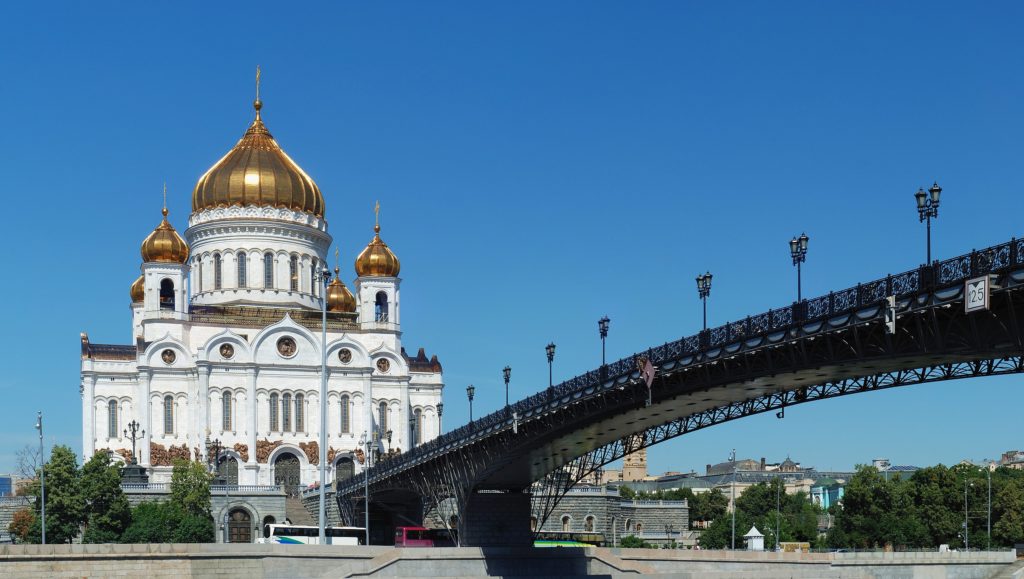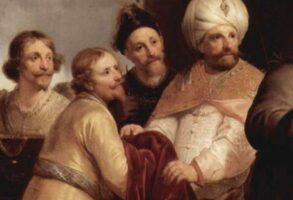
Published March 23, 2022
Syndicated Column
For years, the two leaders of the Russian Orthodox Church with whom Pope Francis met by videoconference on March 16—Kirill, Patriarch of Moscow and All Rus’, and Metropolitan Hilarion, the Church’s chief ecumenical officer—have worked to buttress Vladimir Putin’s efforts to reconstitute a simulacrum of the Soviet Union in the name of a Russkiy mir (“Russian world”). Kirill and Hilarion’s efforts have run the gamut from falsifying the history of Eastern Slavic Christianity to the virtual beatification of President Putin as a figure providentially ordained to save the world from Western decadence and “liberalism.” Most recently, Kirill blasphemously blessed a war of aggression with holy icons.
This shameful enterprise has now been forthrightly rejected by some five hundred Orthodox scholars throughout the Eastern Christian world, in a Declaration on the “Russian World” Teaching.
The Declaration unambiguously deplores the “Russian world” ideology as “a form of religious fundamentalism” that is “totalitarian in character.” Orthodox believers who espouse this ideology cease to be members of the “Church of the Gospel of Jesus Christ, the Apostles, the Nicene-Constantinopolitan Creed, the Ecumenical Councils, and the Fathers of the Church.” In a word, the “Russian world” is a “heresy,” and from that “vile and indefensible” heresy have sprung “the shameful actions of the Government of Russia in unleashing war in Ukraine with the connivance of the Russian Orthodox Church.”
The Declaration goes on to “condemn . . . and reject” six pseudo-theological facets of “Russian world” ideology:
First, the signatories deplore “any teaching that seeks to replace the Kingdom of God, proclaimed and inaugurated by Christ . . . with a kingdom of this world, be that Holy Rus’, Sacred Byzantium, or any other earthly kingdom.”
Second, the signatories “firmly reject all forms of government that deify the state (theocracy) and absorb the Church, depriving the Church of its freedom to stand prophetically against all injustice.” They also “rebuke all those who affirm caesaropapism,” which subordinates obedience to Christ to obedience to a “leader vested with ruling powers and claiming to be God’s anointed, whether known by the title ‘Caesar,’ ‘Emperor,’ ‘Tsar,’ ‘or ‘President.’”
Third, the signatories deplore as antibiblical and heretical “any teaching that attributes divine establishment or authority, special sacredness or purity to any single local, national, or ethnic identity,” or that divinizes “any particular culture.”
Fourth, the signatories reject the demonization of those who are “other” and flatly condemn “any Manichean and Gnostic division that would elevate a holy Orthodox Eastern culture and its Orthodox people above a debased and immoral ‘West.’”
Fifth, the Declaration summons Orthodox believers to exercise authentic Christian responsibility for public life while calling out the hypocrisy of Russian churchmen: “We rebuke those who pray for peace while failing to actively make peace, whether out of fear or lack of faith.”
And finally, the Declaration demands that Russian Orthodox leaders be truth-tellers after the mind of Christ. Those who refuse to “speak the truth or actively [suppress] the truth about [the] evils that are perpetrated against the Gospel of Christ in Ukraine” condemn themselves as cowards, liars, or both. The signatories also “condemn all talk of ‘fratricidal war’” or the “repetition of the sin of Cain, who killed his brother out of envy” if any such use of biblical imagery does not “explicitly acknowledge the murderous intent and culpability of one party over another”—in other words, Russia’s unwarranted assault on Ukraine.
Putin’s savage war has altered so many things on the world political stage that its effects on Eastern Christianity may be overlooked. The sea change that may be underway there is of great importance, however, for two reasons.
For more than a decade, Russian imperial bullying has been paralleled by the bullying of other Orthodox communions by the Patriarchate of Moscow, as it seeks hegemony in the Orthodox world. But because of his pusillanimous actions since the invasion of Ukraine on February 24, Patriarch Kirill’s moral authority is now at the sub-basement level. As Putin’s missiles have shattered Mariupol’, Kirill’s acquiescence in barbarism has shattered Russian Orthodoxy’s campaign to be first among Orthodox equals.
The Declaration on the “Russian World” Teaching also opens important ecumenical possibilities, especially in fostering a dialogue on social doctrine between Orthodoxy and Catholicism. Through the Putin/Kirill dyad, the ancient Byzantine notion of a “symphony” between Church and state has once again led to the Church’s corruption, as Russian Orthodoxy plays chaplain to the czar. The signatories of the Declaration understand that. The door is therefore open to a creative ecumenical conversation on Church, state, society, culture, and economy in the future.
One hopes the Vatican eventually grasps this.
George Weigel is Distinguished Senior Fellow of Washington, D.C.’s Ethics and Public Policy Center, where he holds the William E. Simon Chair in Catholic Studies.
George Weigel, Distinguished Senior Fellow of the Ethics and Public Policy Center, is a Catholic theologian and one of America’s leading public intellectuals. He holds EPPC’s William E. Simon Chair in Catholic Studies.








